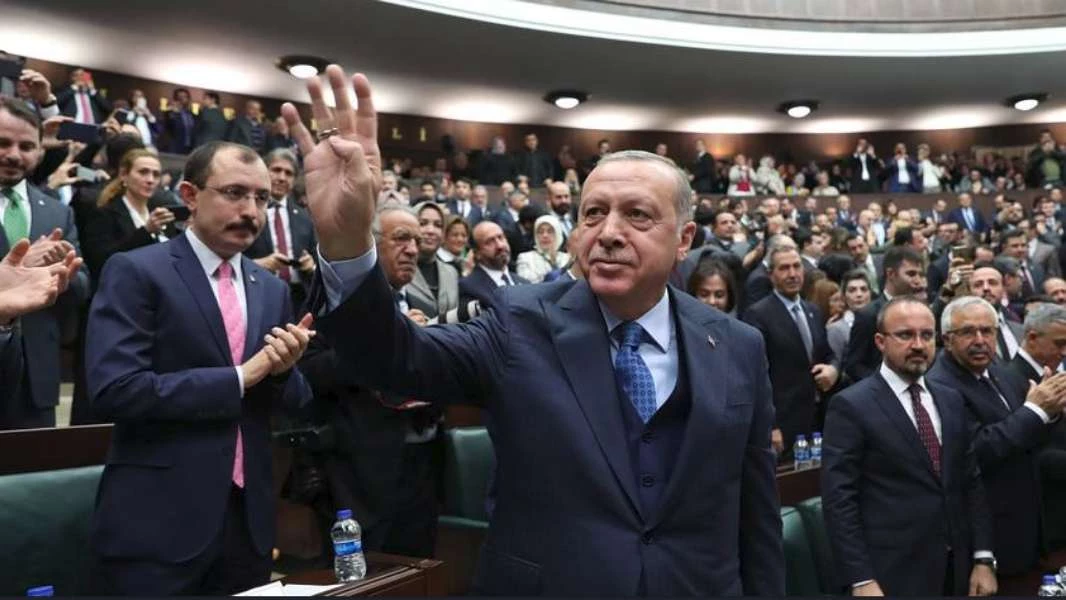Turkish President Tayyip Erdogan greeted lawmakers on Tuesday as he arrived for a meeting at the Parliament in Ankara. Mr. Erdogan said he would soon meet with Russian President Vladimir Putin to discuss Syria.
President Trump’s abrupt decision to withdraw US troops from east Syria, transferring the region to Turkish military control, goes beyond the wildest expectations of Turkey’s President Recep Tayyip Erdogan.
For Mr. Erdogan, this may also turn into an example of the need to be careful what you wish for.
Turkey, which was angling to seize from US-backed Syrian Kurdish forces a much more modest swath of land along its southern frontier, could now become the pivotal power in Syria, establishing a protectorate over a vast and oil-rich territory.
Already, Mr. Erdogan is seeing his ambitions for regional leadership validated by the White House, as Turkey turns from the target of frequent American criticism (and even economic sanctions) to an indispensable partner in Syria and beyond. Mr. Trump even accepted an invitation from Mr. Erdogan to visit Turkey in 2019.
“It will be a game-changer for the region if the US and Turkey were to start working as partners with each other,” said Hassan Hassan, a Syria specialist at the Tahrir Institute for Middle East Policy in Washington. “If the US wants to do something about Iran, it needs a partner in the Middle East—and this partner is Turkey, not Saudi Arabia.”
Yet, the Syria expansion also takes Turkey into a period of new, and to a large extent unpredictable, risks just as its economy starts to emerge from a currency crisis earlier this year. In addition to confronting the Kurds, Turkey will also likely have to contend with Syria’s Sunni Arab areas where sympathies for ISIS extremists still linger.
“If the US is fully withdrawing and Turkey is asked to take over all these areas, it will be too much. Even the US could not do it all by itself—there will need to be local forces supporting the Turkish military, and other actors will have to be standing by Turkey,” said independent Turkish lawmaker Ozturk Yilmaz, the country’s former consul-general in Mosul who was held hostage by ISIS in 2014.
In fact, Turkey may end up cutting a deal with Russia and the Assad regime to take over only part of the territory that the US will vacate—and leaving alone the most troublesome zones, such as Raqqa and lands further south. Mr. Erdogan said Tuesday he will soon be meeting Russian President Vladimir Putin to discuss how to confront the consequences of Mr. Trump’s decision.
“It is certainly more than the Turkish side had hoped for,” said Ahmet Kasim Han, a professor at Altinbas University in Istanbul. “But it still remains a Turkish prerogative how deep its operation should go, and how long for.”
Mr. Trump, for his part, has tweeted that Mr. Erdogan promised him “to eradicate whatever is left” of ISIS in Syria—an expectation that Turkey, rather than Iran or Russia, would be responsible for eliminating the militant group’s remnants
Turkey, with NATO’s second-largest army and sophisticated diplomatic and intelligence services, certainly has more ability to project power than Mr. Trump’s initial ally of choice in the Middle East, Saudi Arabia.
There are many potential pitfalls that could scuttle Turkey’s Syria ambitions and undermine the unfolding realignment of America’s Middle East policy. The biggest unknown is what the YPG Syrian Kurdish forces who currently control eastern Syria—and who would prefer virtually anyone but the Turks to replace American troops—will do in coming weeks.
Turkey views YPG as an existential foe because it is affiliated with the PKK, or Kurdistan Workers’ Party—a movement that has waged a secessionist war in eastern Turkey for decades, and that is classified as terrorist by Ankara and Washington alike. Mr. Erdogan has been sending more troops and tanks to its border with Syria along Kurdish-held areas in recent days.
The American withdrawal doesn’t automatically open the path to a Turkish invasion into Syria’s Kurdish enclave, cautioned Ertugrul Kurkcu, a former Turkish lawmaker and honorary chairman of HDP, the pro-Kurdish party in Turkey’s parliament. Following Mr. Trump’s decision, Russia, Iran and the Assad regime have become “the new interlocutors for the Kurds to negotiate their and Syria’s future,” he said, as the Kurds seek “to protect their political and social gains in the east of Euphrates.”
US troops have forged close bonds with these Kurdish fighters in the common fight against ISIS since 2014, and have come to view YPG fighters as allies and comrades-in-arms. That was one reason why Defense Secretary Jim Mattis and the presidential envoy on fighting ISIS, Brett McGurk, resigned in protest against Mr. Trump’s pullout decision.
The flip side of that shift is a dramatic improvement in America’s ties with Turkey.
“The US withdrawal is eliminating the most egregious irritant in bilateral relations—US support for YPG,” said Sinan Ulgen, a former Turkish diplomat and head of the Edam think tank in Istanbul. “This will vastly improve relations and defuse the prevailing anti-American rhetoric in Turkey.”
In another perhaps unintended consequence, the planned withdrawal could also torpedo Turkey’s rapprochement with Russia and Iran that began, in part, as Ankara’s response to the cold shoulder it was receiving from the Obama administration and, until recently, Mr. Trump.
“Turkey’s cooperation with Iran and Russia is a matter of convenience,” said Yasar Yakis, who served as one of Mr. Erdogan’s foreign ministers. “And their interests in Syria overlap only occasionally.”
Edited according to Orient Net. Link for the original source of WSJ.



التعليقات (0)